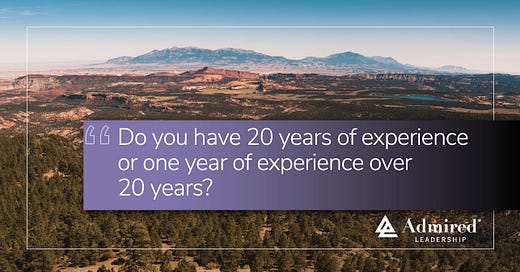Experience Can Be Deceiving
Experience is often weighed too heavily when assessing talent. Leaders commonly place an extra thumb on the scale of experience when judging others. They have learned, falsely, that experience is to be given reverence, much like age and wisdom. They all go hand-in-hand, or do they?
Do you have 20 years of experience or one year of experience over 20 years? Within the answer to that question lies the experience myth — that the longer we do something, the more we learn. This is true only for some people, some of the time.
Experience matters, for sure. No one gets better without lots of practice and repetition. The issue is what learning takes place during the many years of practice. Unfortunately, nothing guarantees insight or wisdom from experience. In fact, doing something wrong for a decade happens more often than we like to admit.
For far too many people, experience does not reflect the competency and insight that so many years of doing the same thing should produce. We over-index experience because it is easy to project a connection between time spent and ability developed. Ironically, that’s been our experience.
But it serves us well to be somewhat suspicious as to what experience counts for. When judging others, the best leaders dig into experience and ascertain the lessons learned and the skills polished. They ask others to unpack their experience and showcase the skills it has fostered. They don’t trust that experience speaks for itself, as they say.
Try not to allow experience to cloud your decisions regarding the quality and skillfulness of others. Judge experience for what it displays, not for what it promises. Experience can be a huge differentiator, but differences in learning and acumen aren’t guaranteed. Experience is a great teacher only when the student is a great learner.




